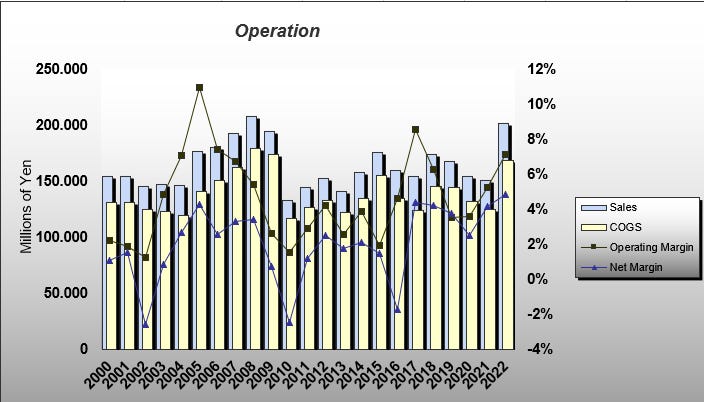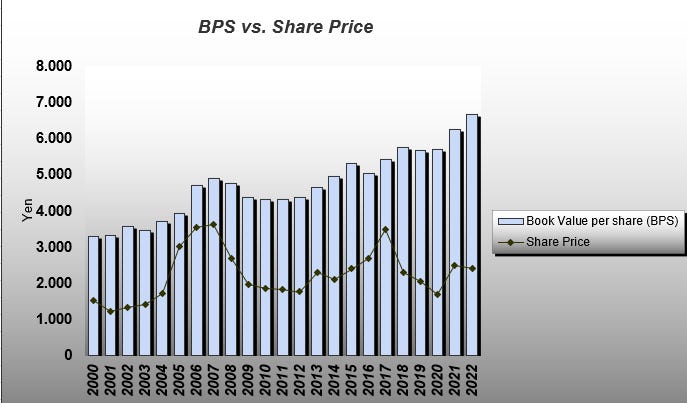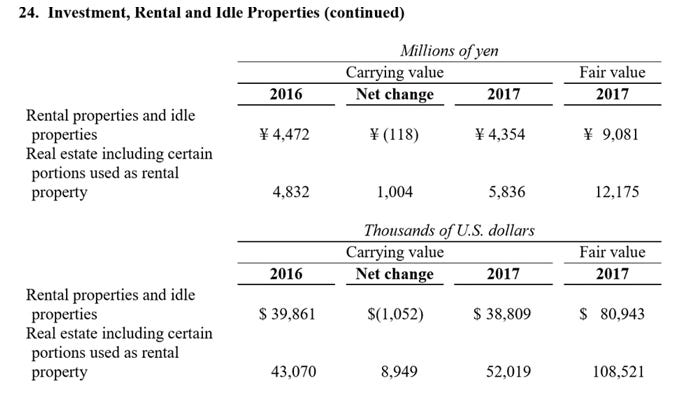Yodogawa Steelworks: A J- Net Beauty
A Japanese Net- Net Stock in the Spirit of Graham and Dodd with Loads of Hidden Assets
Company Overview
Yodogawa Steel Works, Ltd (JP:5451) is an independent Japanese steel company located in Osaka.
The Company operates in four business segments. The steel sheets-related segment manufactures and sells coated steel sheets, galvanized steel sheets and cold-rolled steel products. The roll segment is engaged in the manufacture and sale of steel rolls, non-ferrous rolls, etc. The grating segment is engaged in the manufacture and sale of gratings. The real estate segment is engaged in the leasing and sale of real estate.
Most of its products are provided to corporate customers, such as building contractors and consumer electronics maker, but the company also handles household use storerooms, carports, and photovoltaic power generation, among other things, for general consumers.
It runs plants in Osaka, Kure, Ichikawa, Fukai and Izumiotsu. It started steel sheet sales through own sales offices. It also has a large overseas plant in Taiwan. The joint venture subsidiary Sheng Yu Steel (Sysco), which operates the Taiwanese plant, is listed on the Taiwan Stock exchange.
General Valuation
Current stock price in relation to earnings, book value and sales already qualify Yodogawa being a deep value investment in the spirit of Graham and Dodd.
EPS1 for FY ended March 2022 came in at 340 Yen leading to an actual P/E2 ratio of 7.
Average EPS for the last 23 Years was 111 Yen leading to an average P/E ratio of 22.
The actual P/E ratio appears compelling. The average one less so, given the low margin nature of Yodogawa’s business (see Overview of Operations).
P/E ratios in general are very flawed metrics. Especially in corporate Japan with its high cash balances, big investment portfolios and low financial gearing.
Adjusting for the company*s very conservative financing and accounting EV3/ Ebit4 and EV/ Ebitda ratios are used. The enterprise value of the company stands at 36’795 Mios. of Yen. If Yodogawa’s investment portfolio is excluded, which consists of highly liquid assets, which are marked to market, the EV turns negative (- 3’883 Mios. Of Yen).
An Ebit of 19’880 Mios. of Yen and Ebitda5 of 15’735 Mios. of Yen the EV/Ebit and EV/ Ebitda ratio (incl. Investments) is only 2,3 and 1,9 respectively.
Overview of Operations
Sales suffered significantly during the great financial crisis (GFC) and, after 13 years, finally have recovered to pre-crisis levels. Stated operating margins and net- income margins have been recovering in synchrony but are structurally low and volatile.
For the FY ended March 2022 the company reported 7 % in operating margins and 5 % in net margins.
Stated return metrics and EPS are highly volatile over time. The company reported three loss years in the last 23 Years. Stated ROE6 and ROA7 for the latest FY came in at 4% and 5 %.
Historically, stated return metrics have to be regarded as poor.
Interesting to note is the fact that the company showed quite significant aberration between stated and adjusted operating and return metrics during times of severe business contraction. It is brought forth by extremely conservative accounting procedures. In addition, adjusted return metrics are significantly less volatile.
Analysis of Cash Flow
Quality of earnings is very high in Yodogawa’s case.
At a current market price of 2’400 Yen the stock is trading at an average P/E ratio of 22. Whereas the average P/OCFPS8 ratio stands at only 9.
With 122 Yen per share, average FCFPS9 (23 years) is higher than stated EPS.
Furthermore, FCF generation appears much more stable than the volatility of stated operating, earning and return metrics would suggest.
The significant negative reading for OCF in the FY that ended March 2022 is attributable to a built- up in inventory and receivables due to a significant increase in sales, and a reduction in payables Thus, it should be regarded as cyclical rather than structural.
Interim Conclusion
A well-established Japanese steel company that has been showing low operational and return metrics over an extended period. By scrutinizing stated metrics, discrepancies emerge. It appears that the company is misrepresenting its operational efficiency for the worse and underreporting its true earning power. Quality of earnings are high.
Analysis of Balance Sheet
Yodogawa does not carry any interest-bearing debt on its balance sheet, which is astounding for a steel related manufacturing company.
Stated overall book value per share has been increasing moderately by approximately 3,4 % p.a. The equity ratio stands at a staggering 78%. The decrease around the GFC is attributable to losses on valuation of investment securities and impairment on PP&E.
Asset composition has been seeing a significant transformation over time, away from fixed assets towards more liquid assets. Asset composition is highly favorable. Cash, receivables, and the investment portfolio make up for roughly 55% of total assets. Goodwill and intangibles are negligible.
Yodogawa’s investment portfolio is highly valuable and mainly composed of the biggest two coating manufactures within Japan. Other relevant holdings are a well-established Japanese building material company and an elevator manufacturer.
Yodogawa’s Net Current Asset Value (NCAV) is roughly 3’100 Yen per share. At a current share price of 2’400 Yen the stock is trading at a discount of roughly 22%. If the highly valuable investment portfolio was included (1’413 Yen per share) the discount would widen significantly to roughly 46 % per share.
The stock is even trading at a discount to liquidation value (incl. Investments), which is quite remarkable for a dividend paying and cash generative business. The discount to liquidation value is roughly 20%.
The trend of NCAV is favorable.
The same holds true for the liquidation value.
PP&E Account
Yodogawa’s PP&E10 account is quite remarkable, as it contains significant hidden assets. A golf course, warehouses, a guest house and several other buildings and land, mainly located in the Hyogo prefecture.
Till 2017 the difference between carrying value and fair value of the real estate portfolio was published and showed a significant amount of hidden asset value.
The crown jewel in Yodoko’s property portfolio is the Yodoko Guest house, which was designed by the fabulous and renowned star architect Frank Lloyd Wright. It is the only still existing Wright building in Japan and has been designated as an important cultural property by the Japanese government. Valuing it as priceless is no exaggeration.
Interim Conclusion:
Debt- free Company with a severely overcapitalized balance sheet. Company is a Benjamin Graham net- net stock, trading even below its liquidation value.
Overall business is cash generative over time and EV (incl. Investments) in negative territory. Company is hiding true earning power through extremely conservative accounting policy. Fair value of the real estate portfolio is significantly higher than the carrying value on the balance sheet.
Intrinsic Value/ Margin of Safety
In the last 23 years the discrepancy between share price and intrinsic value has almost never been more pronounced as of today. Based on a highly conservative valuation model incorporating the Graham growth value, discounted dividend value, earning- and asset power value (not adjusted for hidden real estate assets!) the company is roughly 50% undervalued.
More liberal models indicate a higher margin of safety.
Analysis of Shareholder Returns
For the FY that ended 2022 the company paid a dividend of 102 Yen per share. At current market price the dividend yield is 4,2 %. The stated average pay-out ratio over the last 23 years was 42%. The real ratio was, with 27%, significantly lower.
The company is engaged in share repurchases on a continuous basis. The company has been buying back shares in 18 out of 23 years. The share count over time has decreased by roughly 30%.
Share buy backs were mostly executed at extremely value accretive terms for the remaining shareholders. All of them took place below stated book value, and the many even below NCAV and liquidation value.
Corporate Governance
The fundamental analysis of the company conducted begs the question why Mr. Market is valuing the company as if it is heading for bankruptcy.
The fundamentals presented in this post do not indicate any distress the company might be facing. Quite to the contrary. It reveals a company that is delivering positive adjusted owners’ earnings over time, has vast amounts of net liquid assets, no interest-bearing debt and an understated PP&E account.
The only sensible explanation for Yodogawa’s extreme undervaluation is Mr. Market applying a massive corporate governance discount. But is he rightly doing so?
As far as I know the company has never been approached by any activist fund, and the current shareholder register does not indicate any activist involvement momentarily. The company has a take-over defense mechanism in place that might deter any activist shareholder.
Management does not seem to act against the best interest to shareholders in an outright hostile manner (see shareholder return policy). Nevertheless, a more aggressive approach regarding matters concerning capital efficiency and a renunciation of extremely conservative accounting policies is warranted.
Given the severely overcapitalized balance sheet, management should adopt a shareholder return policy based on dividend on equity (DOE). Paying out a certain rate on equity in form of dividends to mend the severe undervaluation of the company.
Conclusion
Yodogawa is an ok business, that is misrepresenting its operational performance for the worse and hiding assets over an extended period. Why it is doing so remains a mystery!
For a long time, the company has had a severely overcapitalized balance sheet. A valuation only based on the net liquid position already indicates a severely undervalued security. If hidden assets are included in the analysis the undervaluation becomes even more pronounced.
On an asset basis the company has been undervalued for a long time, but the discount between intrinsic value and the market price has been steepening significantly in the last 5-6 years.
The main culprit for the steep undervaluation is not to be found solely in poor decisions concerning capital efficiency by management, but also in total ignorance to the situation by market participants within Japan and abroad.
Due to the existence of a poison pill a certain corporate governance discount is warranted. But at Yodogawa Steel Works this discount is going too far.
Disclaimer: Long Yodogawa Steelworks
Undervaluedjapan uses information sources believed to be reliable and accurate. But this cannot be guaranteed. The information contained in this publication is not intended to constitute individual investment advice and is not designed to meet your personal financial situation. The opinions expressed in such publications are those of the publisher and are subject to change without notice.
Earnings per Share
Price to Earnings
Enterprise Value
Earnings before Interest and Taxes
Earnings before Interest and Taxes, Depreciation and Amortization
Return on Equity
Return on Assets
Operating Cash- Flow per Share
Free Cash- Flow per Share
Property, Plant and Equipment






















Great call Otto - up 130% since Sep 2022 plus dividends!
The Price of Steel is rising because of demand. Maybe Yodogawa can benefit from it...